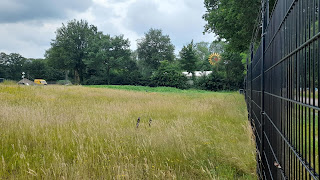Everything is coming together, and the lab is set to open officially in October under the new name of UT Field Lab. We are also working with the Climate Center to expand long term research goals outside and inside of the former BMC building, going beyond testing the performance of green infrastructure and actively involving stakeholders on the larger societal impacts of climate change. This site can lead to more chances for interactive design of solutions for climate change adaptation. But for now, the planned research is being finished, and plant life is growing abundantly.
Initially in April there is not a lot of visual change from March.
In May we can see plant growth as well as the foundations of the green house being laid.
This continues to progess smoothly towards the end of May.
In June we see the construction of multiple research projects heading into the sky, including finally the tallest research tower that will have a weather station.


























